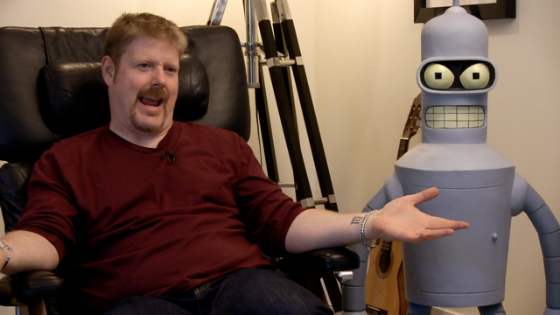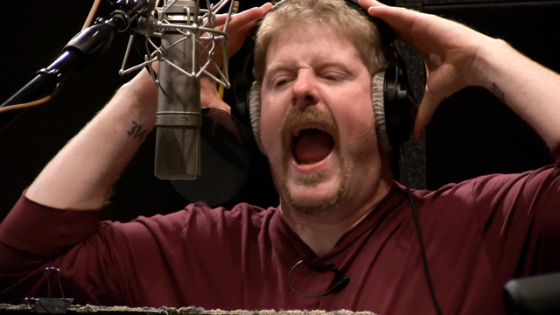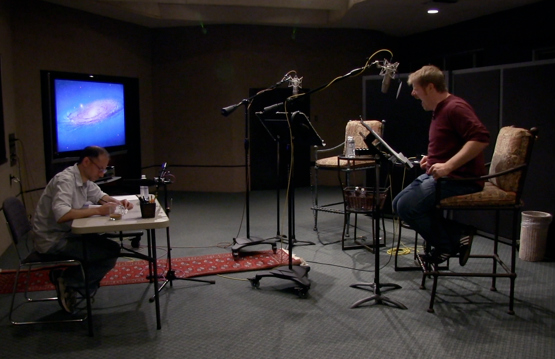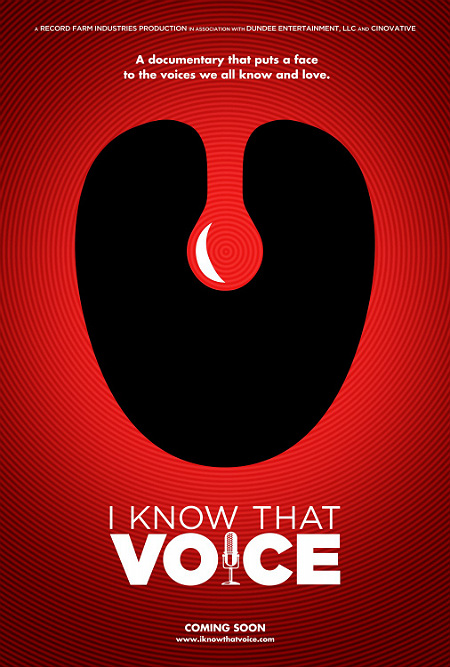TR Interview: Going on a Bender With Futurama and I Know That Voice‘s John DiMaggio
 |
Fans of MTV in the ’90s may remember a skit show called Red Johnny and the Round Guy, one of several attempts at launching more comedy on the music network, along with such shows as The State and You Wrote It, You Watch It. While not necessarily huge hits at the time, those shows helped launch the careers of the likes of Jon Stewart, Thomas Lennon, Ben Garant…and Red Johnny himself, a.k.a. John DiMaggio, whom you all know better nowadays as Bender from Futurama.
Didn’t know that was him? Well, that’s part of the point behind DiMaggio’s new documentary, I Know That Voice. Lifting the metaphorical curtain of secrecy surrounding the recording booth, DiMaggio (who executive-produced and is heavily featured) and director Lawrence Shapiro introduce the audience to many of the faces behind their favorite cartoon voices. We couldn’t not mention Bender in talking to DiMaggio, but our discussion touches on many voice-over topics…as well as what the future may hold for our favorite alcoholic android.
Luke Y. Thompson: On behalf of a site named Topless Robot, it’s an honor to talk to the top robot on TV.
John DiMaggio: (laughs) Thank you very much.
LYT: I was just looking up your bio. It’s been ages since I’ve thought about Red Johnny and the Round Guy.
JDM: Oh my god. You actually remember Red Johnny and the Round Guy?
LYT: I do. I remember one skit where you were like, “You can go to church, or you can go to hell.”
JDM: That’s it! That was one of our big bits. That’s funny. You remembered the big bits. Very good!
LYT: So how did you segue from that into voice acting?
JDM: It’s interesting that you mention that. It’s really where I started to do a lot of character voices on stage. And that’s – when I wanted to start doing voiceover, I talked to my manager at the time and said I was interested in doing voiceover, and she hooked me up with a voiceover agent. She said, “I’ve got a guy, John DiMaggio, and he’s ready.” He said, “John DiMaggio? Who’s that?” She said, “Red Johnny from Red Johnny and the Round Guy.” He said, “Oh my god! Red Johnny!” And that’s how I got a voiceover agent.
That’s how I started, and I booked the first audition that I got. It was a radio commercial for Toyota in New York. [changes voice to New York accent]I played one of these guys. Yeah, oh! [/voice] It was really funny. That’s how it all really started, and then when I got out here, to Los Angeles, there wasn’t a lot of television and radio stuff to do. It was more animation. And so getting to play different characters with that was really great, and then when I got Futurama, it all changed.
 |
LYT: The movie kind of touches on it peripherally, but a couple of years ago, Chris Rock had a famous routine at the Oscars where he said voice acting wasn’t work. Is that part of the impetus to make this movie?
JDM: Um, you know, It was a little bit. It was more to be the Wizard of Oz and show what’s going on behind the curtain. That was more what we wanted to do. The movie was born from an idea, we were – Larry and I – Larry Shapiro, the director; Lawrence to his mother and father – but Larry and I were in Amsterdam for Jam in the Dam. He was shooting footage and I was emceeing it. He brought me on to emcee, just to keep the crowd going between shots and stuff like that. I whipped out the Bender voice onstage, and these four German tourists freaked out – they were like, “You do the robot voice?”
It was weird. We went to the bar after, in between sets – actually, while the band was playing – and they came over to us, and they freaked out. Larry was like, “Dude, we have to document this. We have to figure out a way. This is incredible. This is a wild story.” And that’s how I Know That Voice was born. It started in 2009, and we got Tommy Reid on board, our producer. We got 160 hours’ worth of material, over 150 interviews, just incredible. And now it’s coming out in January – January 7th. Full circle.
LYT: Nice! A lot of regular, non-voice actors took offense to the Chris Rock bit on behalf of voiceover actors. Did it offend a lot of people in the voice-acting community, or did they just take it as a joke?
JDM: I mean, it kind of offended us. It kind of offended us. It was like, “Really, dude?” All he does is his own voice. That’s it. He isn’t doing anything else. It’s a different thing. You’re not working. You’re not doing anything. All you’re doing is reading it off the paper. So it’s like, whatever – people came to our defense, and we came to our own defense, and it’s all good. People can think what they want. You can’t – it’s an opinion, whatever. He took a slap on the wrist for it, so that’s it. People are going to say what they’re going to say.
LYT: From the outside, it sort of seems like it would be a more lonely profession, to go into a booth and record versus being on a set and interacting with actors. I know some animations put everyone in the same room together…
JDM: Yeah.
LYT:…but it really feels like it’s more of a community from this movie, which is the opposite of what you’d think. You’d think of it as a very lonely thing. How does that all come together? Is it like a community?
JDM: Oh, absolutely! I think that one of the things I wanted this movie to do was to let these people that I work with, my peers, hear the applause. You know what I mean?
LYT: Yeah.
JDM: It’s like, they need to get a pat on the back and hear the applause and the room roar, because we don’t really get to do that. We love what we do, and we don’t have to be famous or anything like that. We get it – it’s OK. We’re already good. This wasn’t to make anybody famous, it was just to shine the light a little bit, and I think the movie does that. It’s really something. My peers are a bunch of talented, talented folks, and I just wanted to show everybody – that’s all.
LYT: Is it still accurate to think you do a lot of it in isolation, or do directors more and more put people together?
JDM: No, we do a lot more ensemble recordings than you think. That’s when – I was just saying, that’s when the magic happens. That’s when there’s the show behind the show, when the actors are in the room together and there’s camaraderie between us, and we’re all tossing jokes around and seeing what sticks. That’s really – there’s always something goofy going on in an ensemble recording, if you have the right people in the room, and normally you do. So yeah, it definitely happens a lot more than you think.
LYT: I found it very interesting in the movie where you show people acting different races than they are. You could never get away with that in live-action.
JDM: Yeah, totally. It’s totally great, because you get to play. You really get to perform, and do something that you normally wouldn’t get to do if you were on camera. You can’t do blackface – that’s offensive. But if I’m playing a character, and he’s from a certain place, a certain time period, hey, you know, that’s all that is right there. You really get to play, and you really get to explore. You really get to stretch your range, and show what you can do, and use the environment that you came up in, and be able to have that as something that’s in your side pocket that you can whip out.
 |
LYT: You don’t really deal in this film a whole lot with the new sort of motion-capture animation. Is that something that’s easier for a live actor to do, or for a voiceover artist to do? What do you think?
JDM: It depends on the kind of shape that the voice actor is in. I just did some MoCap, my first time, and it was pretty cool! It’s kind of a mixture of both. You really have to have a wonderful imagination to be in a MoCap suit and performing and shooting scenes for a video game, or whatever it is. I sometimes say voice acting is like acting with your hands and feet tied behind your back. I think MoCap is voice acting, but as a marionette. [chuckles]It’s pretty cool. I enjoyed it. I enjoyed doing MoCap. That was a lot of fun, and a lot of the actors that were in the room were VO people, which is interesting.
LYT: And then there is the sort of half-way between, like Rango, where they film the actors performing in a studio, and then base the animation on it without motion capture.
JDM: Yeah, that was innovative. That was really cool. That was really cool stuff. Rango. They should do something else with that.
LYT: So I understand that there is going to be a Futurama/Simpsons crossover episode coming up. Have you recorded that yet?
JDM: There is. Yes, we have recorded it. We recorded it a couple of months ago, and it’s really, really funny, and it’ll be airing in May. I think the middle of May. So whatever Sundays are in the middle of May, check those dates! [chuckles]I don’t want to give a bad date, but check your local listings. Yes, Bender plus Homer equals comedy. It’s really, really funny, and we had a really fun time recording it. That table read was a trip!
LYT: Now I’m sure you probably can’t tell me much about it, but does it address the fact that Futurama had a closed loop ending, or does it open that loop up again?
JDM: I’m not saying nothin’!! [laughter]You’re going to have to find out for yourself. That’s funny. I’ve got to leave you hanging on that!
LYT: I’ve got to try.
JDM: Yeah, right.
 |
LYT: Bender’s full name of Bender Bending Rodriguez – was that based on Benicio Del Toro’s character in Traffic?
JDM: No, I don’t think so. To the best of my knowledge, no. His last name is Rodriguez because he was made in Mexico, so…Hecho en Mexico.
LYT: When you did episodes of Futurama like the take-offs on Scooby Doo and G.I. Joe and all that, do you hear from the original voice actors from those shows, giving you a thumbs up?
JDM: No, we never heard anything from anybody, but that would have been funny. Those episodes cracked me up! They really, really made me laugh, especially when Dave Herman played the voice of the Professor in the Voltron episode. That was really, really, really funny. [laughter]Yeah, that would have been great, to have…you know, did we have the original Freddy? Did he do it? No, he didn’t do it. I’m thinking of…oh goodness, now his name slips my mind. I see his face, and I can’t remember his name! Oh my god! The guy who plays Nibbler. Frank Welker! Geez. Big brain fart on one of the biggest names ever. That’s funny.
LYT: I interviewed Maurice LaMarche a while back, and he was telling me about a time he was waiting at an audition, and they actually had Ben Kingsley come in and audition, and he said even Ben Kingsley had to come in and prove how he sounded, because they didn’t necessarily know that he would work for the part without doing that. But it seems like a lot of the time they get these big names and they don’t try them out like that. Do you find that that’s happening more and more?
JDM: You know, it’s funny – when you’re listening to a celebrity voiceover, you can really hear the imperfections. You can hear that they’re not…there are certain – I don’t know, it’s funny, they stand out more, and I don’t know if it’s a good thing or a bad thing, especially in voice over, because it’s so specific. It’s microscopic. It really shines a light on one of your talents. You know what I mean?
LYT: Yeah.
JDM: So if a celebrity is lacking in their vocal department, but not their acting department, then their vocal department – it’s going to show.
LYT: On the other hand, you’ve got guys in here like Breckin Meyer, who I think of as a celebrity, and I had no idea half of the voices that he did were his.
JDM: Yeah, yeah. He’s pretty funny, too. He’s a pretty funny guy. He nails stuff. That was a good interview. We had a good interview. He’s a good guy.
LYT: Do you ever get to the level in this field where you’re so big that you don’t have to audition, because they know that you’re going to do a good job, no matter what it is?
JDM: No, you always have to. I’ll have to audition till the day that I die. I mean, sometimes people will call me in, and just say “John has this in his back pocket, I know what we want to do for this. Just bring John in.” And other times, you’ve got to audition three or four times for a job. But no, that never ends. It never ends. Nor should it – you should have to prove yourself, and competition is good for the soul.
LYT: Do you think guys like Mel Blanc or Casey Kasem ever reached that level, or would they have been in the same position?
JDM: Well, I mean…Mel Blanc, he originated this job. He was the original gangster! He was the guy everyone wanted to at least be like. So he was their guy. He was THE guy. He created the job – voice over actor for cartoons, that’s him. So I don’t think he really had to deal with it. But, I mean, Casey Kasem? He was a DJ, and he did Scooby Doo, and he did it for a long time. I got to see him do Scooby Doo – that was a trip! I got to work on an episode of Scooby Doo. He was towards the end of his career, so it was kind of rough, but he still had it! He still had it. It was a trip. All I wanted to do was have a bowl of cereal and sit down and not record – I just wanted to listen to the cast! You know – those guys. The veterans from way back – they still have to come out and audition.
LYT: In addition to freeing you up on the characters you’re able to play in voice over, it also seems like there’s a storytelling freedom to show different types of characters. I can’t imagine anyone short of Archie Bunker that you could do like Bender in live action. Do you find that there’s more liberty to play sort of darker characters?
JDM: There’s definitely more liberty. Now with all of the adult-themed cartoons that are out, you can definitely do a lot more really diverse characters and really dark characters, and then quite offensive. It all depends on what you think is offensive. Classic example is Boondocks. I mean, Uncle Ruckus on Boondocks – that character is absolutely one of the most offensive, most hilarious characters on television. There are all sorts of stuff that you can have that if you wanted to try to have it as a live action thing, it doesn’t work.
LYT: That’s a good one to bring up, because they tried to do a Kickstarter for a live-action Uncle Ruckus movie and it didn’t make it.
JDM: Yeah. No, I know – that would have been good for Gary Anthony Williams. He would have been great, too. But that would have been rough – that would have been rough. It would have been tough to watch. But it would have been funny as hell, because he’s funny. You never know.
LYT: Aside from the Simpsons episode, do you think we’ve seen the last of Bender, or is there a chance for anything else?
JDM: You know, you never know. Futurama has come back from the dead so many times, anything could happen. Matt Groening – he’s hinted at things, here and there. And it’s just like – listen, Matt’s doing it, I’m on board. Whatever the case – if it comes back, great. If it doesn’t, we had a fantastic run, and that’s that – you move on. But I would love for it to come back, and who knows? Who knows what’s in store?
LYT: What’s your favorite piece of Bender merchandise you’ve ever seen?
JDM: It’s the four foot tall Bender that I have in my office. It’s a beautiful statue of Bender. It’s pretty awesome!
LYT: And what’s up next for you? What can we expect on the horizon?
JDM: Well, this film, I Know That Voice debuts on iTunes January 7th of 2014, all English-speaking territories – it’s a big deal, I’m really excited about that! There’s other stuff, here and there. I’m still boogieing along with Adventure Time. You’ll hear my voice on certain advertisements, coming up soon, and I’ve got some Sanjay and Craig – all different kinds of gigs that I pop up in every once in a while. But yeah, I’m keeping busy – everything is good. [chuckles]
LYT: Have you ever met any of the guys who have dubbed your characters in other countries?
JDM: No, I have not, and I think you’re actually the second person to ask me that. That’s pretty funny. No, I have never met those guys, but I have been told by some Parisians that it’s funnier in English as opposed to in French.
LYT: I’ve actually heard that too. I have two brothers who live in France.
JDM: There you go.
LYT: They think that most of the voice over dub actors are sub-par compared to the Americans.
JDM: Well, that’s it! That’s funny. [chuckles]
LYT: Thank you so much for talking to us, and good luck with this movie.
JDM: Thank you very much. I appreciate it, man. January 7, 2014 – it’s going to be awesome!

